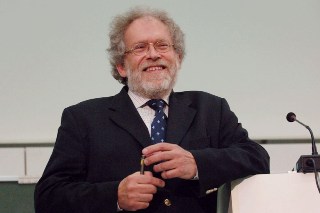Apr 20 2015
It may be too early for Halloween. But later this month a lauded scientist will come to Stanford to discuss an observation Albert Einstein once described as "spooky."
 Professor Anton Zeilinger of the University of Vienna will deliver this year's Robert Hofstadter Memorial Lectures on April 20 and 21. His topic: quantum entanglement. Credit: Peter Pulkowski / Gutenberg University
Professor Anton Zeilinger of the University of Vienna will deliver this year's Robert Hofstadter Memorial Lectures on April 20 and 21. His topic: quantum entanglement. Credit: Peter Pulkowski / Gutenberg University
The spooky – but not scary – revelations will come April 20 and 21 when Professor Anton Zeilinger of the University of Vienna and the Austrian Academy of Sciences delivers this year's Robert Hofstadter Memorial Lectures.
"Dr. Zeilinger is one of the great experimental physicists in the world," said Stanford physics professor Leonard Susskind, chair of the committee of faculty members who selected this year's speaker. "In a very profound way, he is one of the founders of the experimental study of quantum mechanics."
Quantum mechanics is the field of physics devoted to the properties of atoms and other microscopic particles, and describes the odd and counterintuitive ways they interact with one another. The rules of quantum mechanics differ substantially with the observations of classical physics, which is largely concerned with the movements and interactions of larger objects. Zeilinger is especially known for his work on quantum entanglement, the concept that troubled Einstein.
"Einstein called it 'spooky action at a distance'," Zeilinger said.
Einstein and fellow physicists Boris Podolsky and Nathan Rosen first described quantum entanglement in 1935. They theorized that microscopic particles, created together and later separated by great distances, could remain "entangled" with each other. Thanks to this "entanglement," an observer measuring one of the particles will instantaneously influence how the other particles are measured, even if the other particles lie far away.
Quantum entanglement permits atomic-scale communication over large distances. This has furthered the development of quantum computers, which use the properties of quantum mechanics to accomplish tasks ordinary computers struggle to do. Entangled particles could also enable other methods of communication using quantum mechanics, which Zeilinger has explored through his experiments.
"He's one of the pioneers in this subject," said Susskind. "He has opened up many, many new ways to test entanglement."
"These are not just curious topics. They can be useful," Zeilinger said. "For example, you can have quantum communication and quantum cryptography, where you can send messages over large distances."
Zeilinger has theorized and tested how multiple particles behave when entangled, and how bits of information could be shared or transmitted through entanglement. He has also studied entanglement on a variety of atomic scales, from large and complex molecules down to photons.
His efforts to understand and apply quantum entanglement have earned Zeilinger several awards, including the Isaac Newton Medal, the King Faisal International Prize and the Wolf Prize in Physics. Zeilinger's variety of academic interests, including experimental approaches and theoretical work, explains why he was a natural choice to give this year's Hofstadter lectures.
"Bob Hofstadter was a man of enormously broad interests in science," said Susskind. "The only thing that he would have cared about is that we have great physics talks."
"I really appreciate that they find my work sufficiently interesting," Zeilinger said. "One always feels humbled when selected for something like this."
Zeilinger's evening address, "Entangled Photons: Einstein's Spooky Action in Quantum Communication and Teleportation," will begin at 8 p.m. on Monday, April 20, in the Hewlett Teaching Center, 370 Serra Mall, room 200. The talk is intended for a general audience. Zeilinger will introduce the concept of quantum entanglement and other topics on quantum mechanics.
"For that talk, I want to show entanglement in an intuitive way, with some examples," Zeilinger said. "No equations! Or maybe just one to keep the physics colleagues in the audience happy."
His afternoon colloquium, "Quantum Entanglement in Higher Dimensions," will be held at 4:15 p.m. on Tuesday, April 21, in the Hewlett Teaching Center, room 201. It will be a more technical talk aimed at physicists and other interested scientists. Both events are open to the public.
Held annually since 1993, the lecture series commemorates Robert Hofstadter, who was a professor of physics at Stanford for 40 years until his death in 1990. In 1961, Hofstadter received the Nobel Prize in physics for his experiments that probed the internal structure of atoms.
James Urton is an intern at the Stanford News Service.
Source: http://www.stanford.edu/